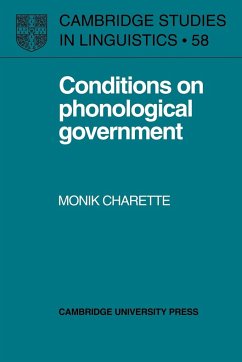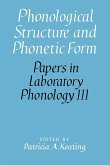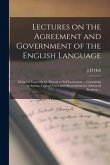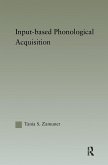This book represents a major development in the analysis of phonological processes.
This is the first extended study written within the framework of Government Phonology. Following the presentation of the main aspects of this theory, the process of vowel-zero alternations is addressed and analysed together with the idea that phonological processes are determined by principles of Universal Grammar along with parameters that distinguish languages. By using predominantly the alternation between schwa and zero in French, Monik Charette demonstrates that vowel-zero alternations are neither cases of insertion nor of deletion. Rather, they involve the interpretation of 'empty nuclei', i.e. nuclei with no segmental content, which must be licensed by proper government. It is when proper government fails to apply that a vowel is realized. Dr Charette also gives consideration to the constraints to which proper government is subject. She argues that these constraints result from phonological principles in conflict. This book represents a major development in the analysis of phonological processes. The extension of grammatical principles and parameters to phonological phenomena is well argued, and will interest theoretical phonologists and specialists of French alike.
Table of contents:
Preface; Introduction; 1. A theory of government in phonology; 2. The 'e-muet' in French; 3. Earlier treatments of schwa; 4. An analysis of schwa in terms of government; 5. Licence to govern; 6. Word-final empty nuclei; 7. Compounds and phrases; 8. The alternation between schwa/zero and [e]; 9. Miscellaneous issues; Conclusion; Notes; References; Index.
Hinweis: Dieser Artikel kann nur an eine deutsche Lieferadresse ausgeliefert werden.
This is the first extended study written within the framework of Government Phonology. Following the presentation of the main aspects of this theory, the process of vowel-zero alternations is addressed and analysed together with the idea that phonological processes are determined by principles of Universal Grammar along with parameters that distinguish languages. By using predominantly the alternation between schwa and zero in French, Monik Charette demonstrates that vowel-zero alternations are neither cases of insertion nor of deletion. Rather, they involve the interpretation of 'empty nuclei', i.e. nuclei with no segmental content, which must be licensed by proper government. It is when proper government fails to apply that a vowel is realized. Dr Charette also gives consideration to the constraints to which proper government is subject. She argues that these constraints result from phonological principles in conflict. This book represents a major development in the analysis of phonological processes. The extension of grammatical principles and parameters to phonological phenomena is well argued, and will interest theoretical phonologists and specialists of French alike.
Table of contents:
Preface; Introduction; 1. A theory of government in phonology; 2. The 'e-muet' in French; 3. Earlier treatments of schwa; 4. An analysis of schwa in terms of government; 5. Licence to govern; 6. Word-final empty nuclei; 7. Compounds and phrases; 8. The alternation between schwa/zero and [e]; 9. Miscellaneous issues; Conclusion; Notes; References; Index.
Hinweis: Dieser Artikel kann nur an eine deutsche Lieferadresse ausgeliefert werden.





![Catalogue of North-West Government Library, Regina [microform] Catalogue of North-West Government Library, Regina [microform]](https://bilder.buecher.de/produkte/65/65587/65587115m.jpg)
![Catalogue of the Free Public Library of the City of St. John, N. B., Together With Rules and Regulations for Its Government [microform] Catalogue of the Free Public Library of the City of St. John, N. B., Together With Rules and Regulations for Its Government [microform]](https://bilder.buecher.de/produkte/66/66112/66112936m.jpg)

